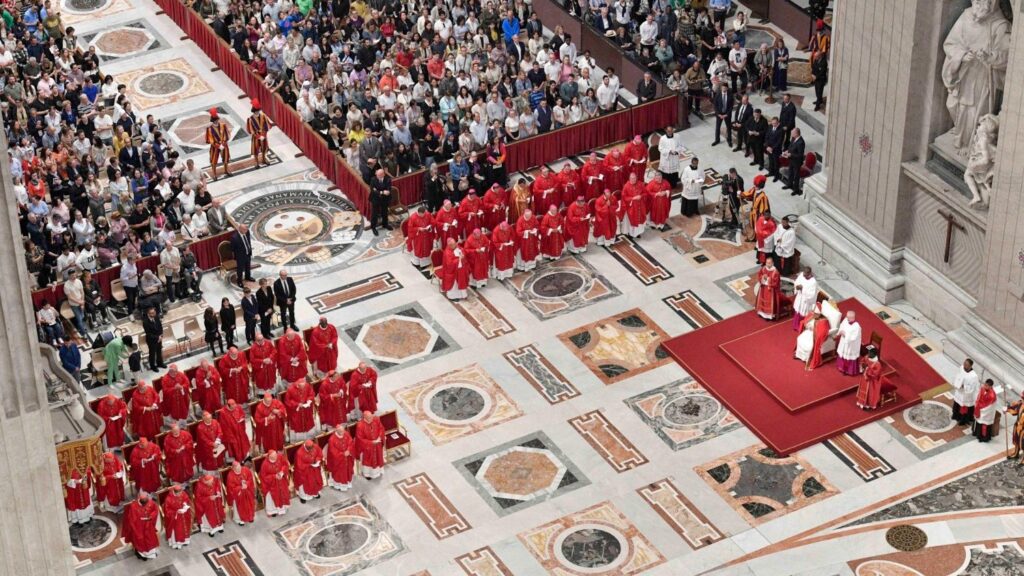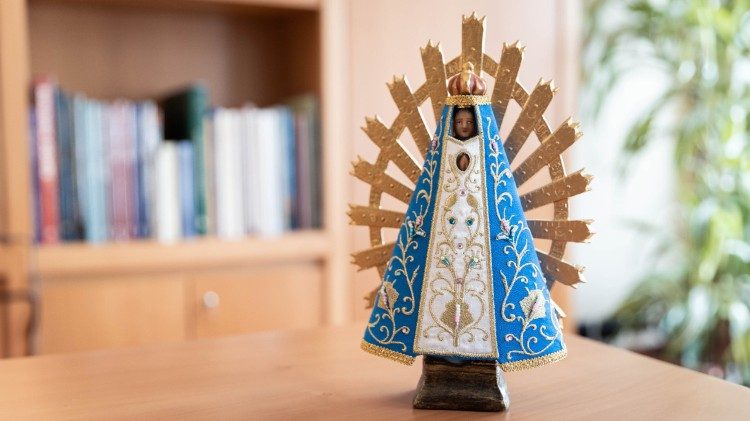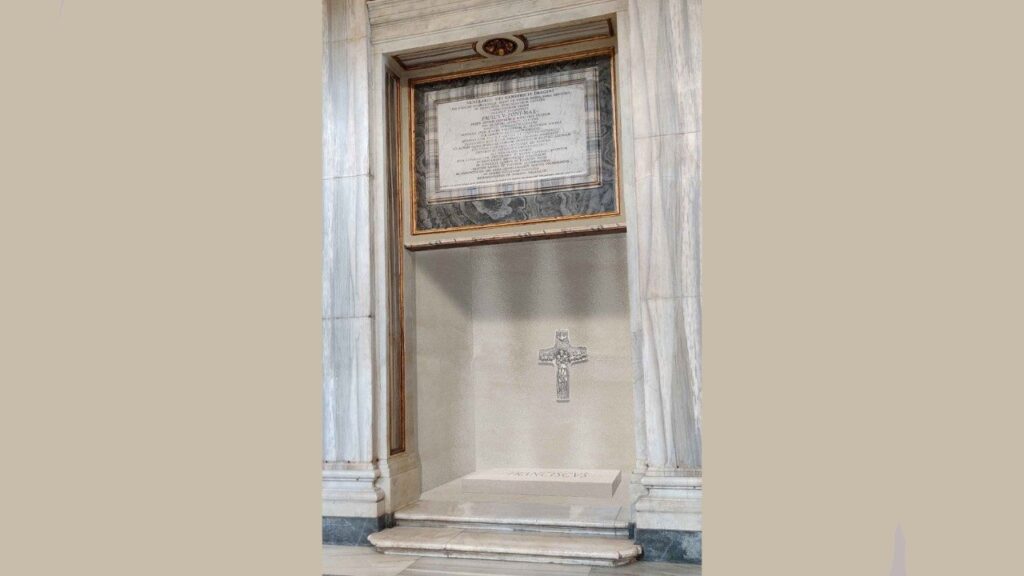The Pope: The Liturgy as the “true” prayer of the Church
74th National Liturgical Week [Modena, 26-29 August 2024]

We publish below the message that the Holy Father Francis has sent – through the Cardinal Secretary of State, Pietro Parolin – to H.E. Msgr. Claudio Maniago, Metropolitan Archbishop of Catanzaro-Squillace and President of the Centre for Liturgical Action, and to all the participants in the 74th National Liturgical Week, which will take place in Modena from 26 to 29 August 2024, on the theme “In the liturgy, the true prayer of the Church. People of God and ars celebrandi”. “The fruit of lips that give thanks to his name” (Heb 13:15)”:
The Pope highlights the aspects of choral singing, sacred singing and silence: they favour deep and intimate prayer, far from frenzy, noise, and chatter.
***
Message of the Pope
His Reverend Excellency
Archbishop CLAUDIO MANIAGO
Metropolitan of Catanzaro-Squillace
President of the Liturgical Action Centre
Your Reverend Excellency,
I am pleased to convey the Holy Father’s message for the work of the 74th National Liturgical Week, organized by the Liturgical Action Centre and hosted by the Church of Modena-Nonantola, rich in history and gifts of holiness. In greeting those who are taking part in the Week as organizers, speakers, conference participants and volunteers, Pope Francis assures a special remembrance in prayer, for the best success of the study sessions and celebratory moments.
The Liturgical Week you are about to experience takes as its theme: “In the liturgy the true prayer of the Church. People of God and ars celebrandi. “The fruit of lips that acknowledge his name” (Heb 13:15). This theme recalls to us the specificity of liturgical prayer, which shuns all forms of individualism and division. It is, in fact, “participation in Christ’s own prayer addressed to the Father in the Holy Spirit” (Catechism of the Catholic Church, no. 1073); it is sharing in the loving breath of the Church-Bride, which makes one feel part of the community of disciples of all places and times; it is a school of communion that frees the heart from indifference, shortens the distance between brothers and sisters, and conforms to the sentiments of Jesus; it is the high road that transforms us, educating us in the Church on the good life of the Gospel.
Dear friends, the liturgy – as Romano Guardini stated – “introduces the full breadth of the truth in prayer; indeed, it is none other than the prayed dogma, the truth relived in prayer” (The Spirit of the Liturgy). The great theologian’s words reiterate the evidence of the objective dimension of the liturgy, which “asks to be celebrated with fervour, so that the grace poured out in the rite is not dispersed, but rather reaches the experience of each one” (Pope Francis, Catechesis, 3 February 2021). This inescapable need also transpires from your study programme, which focuses on the ars celebrandi, a commitment and attitude that all the baptized are required to live in order to supersede their individuality and open up to the “we” of the Church in prayer.
In the Apostolic Letter on liturgical formation, Pope Francis recalls that the gestures typical of the assembly, such as gathering together, the posture of the body, remaining silent, the expressions of the voice, the involvement of the senses, are the ways by which it participates in the celebration (cf. Desiderio desideravi, 51). He goes on to add that “everybody doing together the same gesture, everyone speaking together in one voice — this transmits to each individual the energy of the entire assembly. It is a uniformity that not only does not deaden but, on the contrary, educates individual believers to discover the authentic uniqueness of their personalities not in individualistic attitudes but in the awareness of being one body” (ibid).
Starting out from this perspective, the Holy Father wishes to offer you some concrete priorities to focus your reflection on the liturgy as the “true” prayer of the Church.
The first commitment, which is required of us, is to rediscover the choral nature of liturgical prayer, through which, uniting ourselves to the mother tongue of the Church, we become one body and one voice. Saint Augustine reminded us of the profound relationship of our prayer with Christ: when we pray we speak to God, it is Jesus himself who “prays for us, prays in us and is prayed to by us. […] Let us therefore recognize in Him our words, and His words in us’ (Expositions on the Psalms 86, 1). The beauty of the truth of Christian prayer resides precisely in this interweaving of voices, which we might justly call chorality. Every Christian prayer is always made up of several voices, just as every liturgical action is performed by several hands: we are joined to Christ, and in Christ we rediscover all humanity. Now the value of this chorality in liturgical prayer must not simply be asserted; it must be experienced through our celebration. One of the most important moments in which we can have this experience is the Liturgy of the Hours, which still deserves commitment in order effectively to become the prayer of the people of God. May our communities return to raising in chorus the prayer of the Psalms, and learn to live, in the liturgy and in life, the value of unity and communion.
The second aspect proposed to your commitment to liturgical pastoral care is the relationship with sacred hymns. Music in the liturgy is not an ornamental element, but rather an integral and necessary part of it (Sacrosanctum Concilium, 112), contributing together with the other languages that make up the liturgy to the epiphany of the mystery celebrated. Indeed, in hymns, the faithful live and express their faith. Saint Paul VI, with great wisdom, wrote in this regard: “If the faithful sing, they do not leave the Church; if they do not leave the Church, they preserve the faith and Christian life” (Address to the Plenary Assembly of the Italian Episcopate, 14 April 1964). The Pope therefore advises special care, in particular in the celebration of the Sunday Eucharist, recalling how in song, through the harmony of voices, the spiritual union of those in communion is expressed, the joy of the heart is manifested and the communitarian nature of those who approach to receive the Eucharist is highlighted (cf. General Instruction of the Roman Missal, 86).
The third aspect relates to the silence the liturgy teaches us, as shown by the constant reminders in the Eucharistic synaxis of the act of keeping silent. The Pope, therefore, asks us to counteract the frenzy, noise and chatter that undermine us in our daily lives by valuing sacred silence, an eloquent gesture, a favourable time and fruitful space to remain in the love of the Lord, cultivate a contemplative gaze, give depth to the prayer of the heart and let oneself be transformed by the Spirit. This familiarity in welcoming silence is the true prerequisite for the Church to be able to listen to the One who reveals Himself in “a still small voice” (cfr. 1 Kings 19:12).
The fourth and final dimension the Holy Father entrusts to your care is the promotion of liturgical ministeriality, as the fruit of being the Church of the Pentecost (cf. Desiderio desideravi, 33). From this point of view, and not from a functional perspective, it is important to interpret the ministries at the service of the liturgy: indeed, in them, the diversity of the gifts that the Holy Spirit inspires in the Christian community is manifested. The presence of a diversified ministeriality, nourished by communion in Christ, fosters the active participation of the assembly and promotes co-responsibility in the mission, manifesting, in concrete terms, the synodal nature of the Church. This awareness, as Pope Francis reminded us (cf. ivi 38), demands constant commitment to formation,
so that personalism and delusions of protagonism may be avoided and a true service to communion can be achieved.
The Holy Father, in conveying his blessing to Your Excellency, to Archbishop Erio Castellucci of Modena-Nonantola, bishop of Carpi, the other Prelates and all the participants, hopes that these recommendations may encourage our Christian communities to experience liturgical prayer as an encounter with the Risen Lord and with His Body, the Church.
In adding my personal good wishes, I avail myself of the circumstance to confirm my distinguished reverence to
Your Most Reverend Excellency
Pietro Cardinal Parolin
Secretary of State
_______________________________________
Holy See Press Office Bulletin, 26 August 2024
Related

Pope Francis Gifts a Statue of Our Lady of Luján to Gemelli and the Catholic University of the Sacred Heart
Exaudi Staff
25 April, 2025
2 min

Francis’s Tomb: A Legacy of Humility and Closeness
Exaudi Staff
25 April, 2025
4 min

The Family: A School of Love, Forgiveness, and Hope
Laetare
25 April, 2025
3 min

His Hope Does Not Die!
Mario J. Paredes
24 April, 2025
6 min
 (EN)
(EN)
 (ES)
(ES)
 (IT)
(IT)

